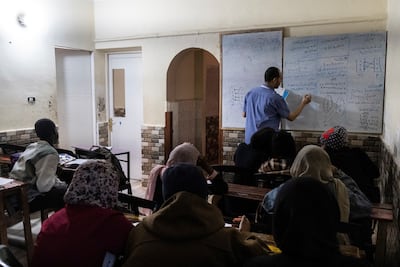An Egyptian man has been referred to criminal court on charges of kidnapping, sexually assaulting and murdering a 10-month-old Sudanese girl.
The incident has sparked outrage and renewed concerns about the safety of migrants and refugees in Egypt.
Egypt’s Public Prosecution Office, which issued a statement on its investigation on Wednesday, said that the man abducted the infant, whose name was given as Janet, as she played with her older sister in front of their home in Nasr City, a district of Cairo.
She was taken to a nearby park where she was sexually assaulted and then strangled to death, according to the prosecution’s investigation.
The suspect was arrested last week and has since confessed during questioning, the prosecutors said. He faces the death penalty if convicted, they added.
The harrowing crime comes amid a surge in anti-Sudanese sentiment in Egypt.
There has been a large influx of Sudanese migrants into Egypt since the country descended into civil war more than a year ago.
Egypt has long been a refuge for people fleeing conflict and poverty in sub-Saharan Africa and the Middle East. The International Organisation for Migration (IOM) estimates that the country hosts more than nine million migrants, around half of whom are Sudanese.
However, only 600,000 of the migrants in total are classified as refugees, and most are legal residents, according to an April report by the UN refugee agency (UNHCR).
Since Sudan's civil war started in April last year, 1.5 million Sudanese people have sought refuge in neighbouring countries. About 500,000 of them have fled to Egypt, according to UNHCR data issued on April 12.
Before the war, there were only 60,000 Sudanese refugees and asylum seekers in Egypt registered with the UNHCR.
The majority of the refugees are women and children who arrived after arduous and dangerous journeys to Egypt with few resources, in urgent need of food, shelter, and medical care, the UN has said.

Egypt’s government has repeatedly warned that the influx has strained the country’s already overburdened public services and social protection networks.
Egypt's Prime Minister Mostafa Madbouly alleged in a speech on Monday on the sidelines of the World Economic Forum in Riyadh that the cost of hosting migrants is $10 billion per year, although critics caution that those figures lack transparency, and that migrants also contribute substantially to the economy.
Egypt has repeatedly complained of the inadequacy of international aid in light of the increasing influx of refugees and migrants into its territory. The government has made repeated calls for increased international support, most recently during Mr Madbouly's meeting last week with the Director General of the International Organisation for Migration, Amy Pope, during which he reissued his calls for more financial aid.
Rights groups say Egypt has a mixed record on protecting migrants and refugees. While the country has maintained an open-door policy, it lacks a comprehensive asylum system and limits access to public education, health care, and formal employment.

Many Sudanese refugees face precarious living conditions, restrictions on movement, and racial profiling by the police.
Since the start of the war, Egyptian security agencies have detained and deported hundreds of Sudanese refugees, including dozens registered with the UNHCR, according to an investigation by The New Humanitarian which included testimonies from migrants who were held in a network of secret military bases without access to legal representation or the United Nations' refugee agency.
Security officials denied any policy of migrant round-ups, saying those deported had criminal records or lacked legal status.
Rights groups say Egypt must do more to uphold the rights of refugees and combat rising xenophobia. They argue that crimes against migrants and refugees should be prosecuted firmly, but without vilifying entire communities.
The latest killing of the Sudanese girl underscores the vulnerability of migrant and refugee children in particular, who often face heightened risks of violence, exploitation, and abuse.


